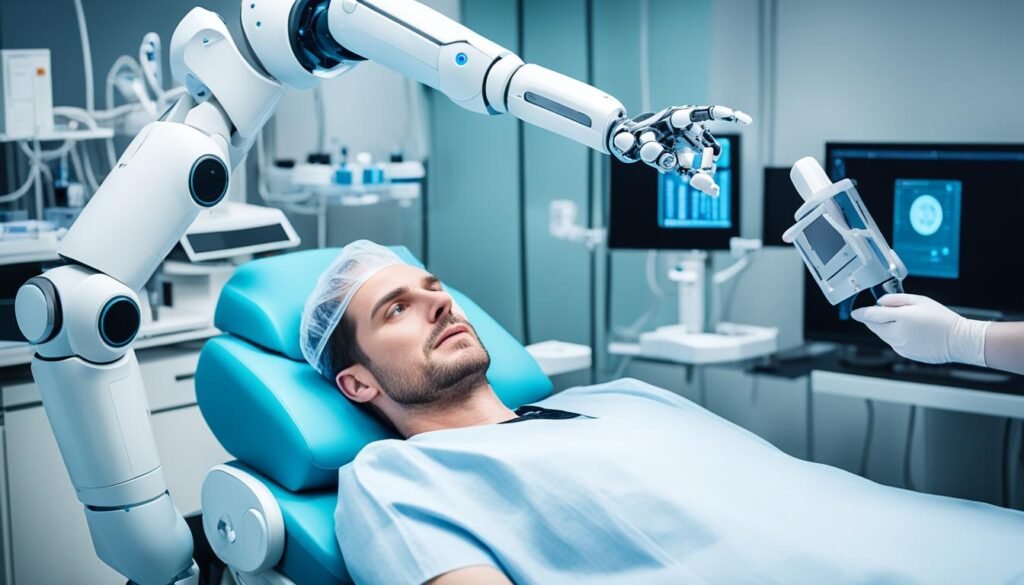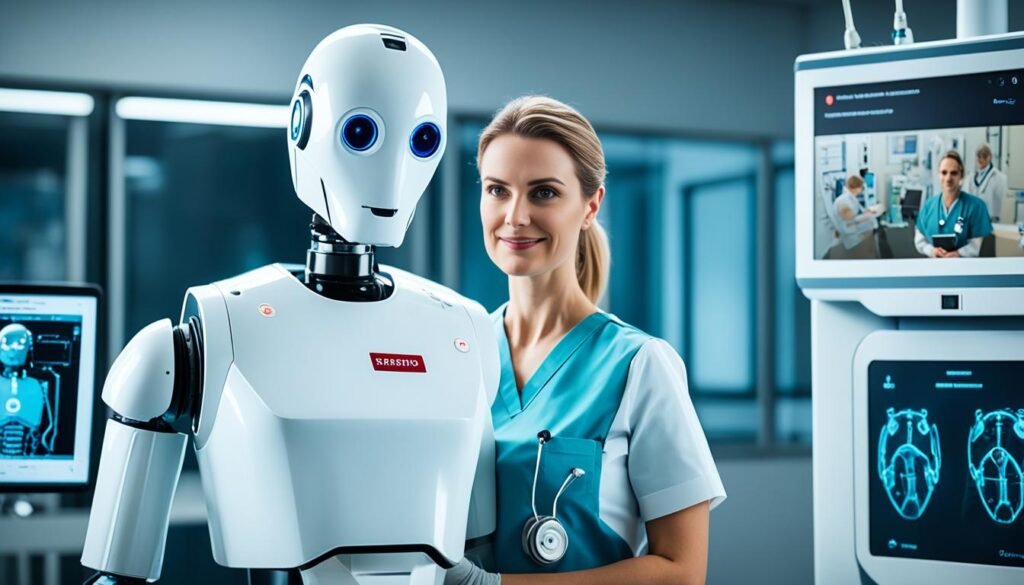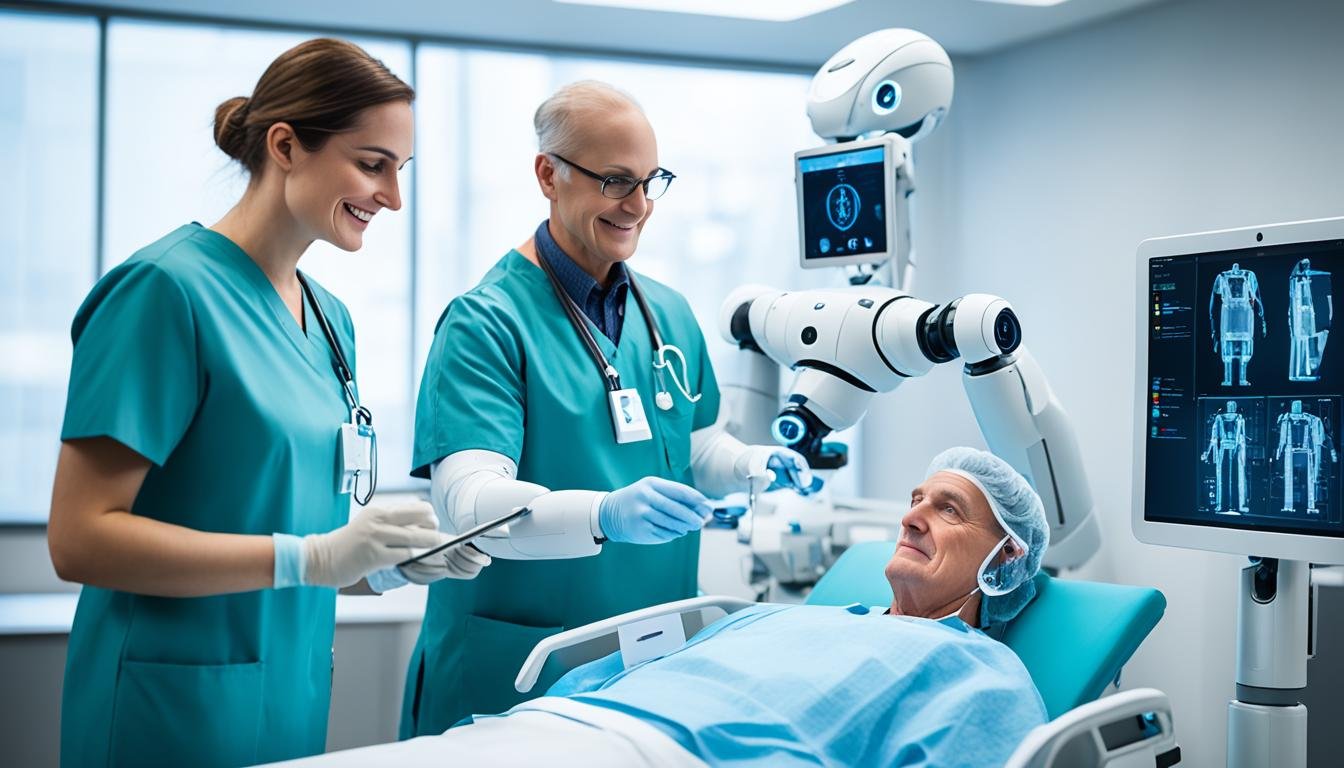Over 80% of people said they would use fitness tech, showing a big interest in health monitoring gadgets. This shows how tech is becoming key in healthcare. It’s setting the stage for AI’s big role in nursing and patient care.
AI is changing healthcare fast, bringing both good and bad changes. It makes things more efficient and helps with making decisions. But, there are worries about mistakes, biased algorithms, privacy, and legal issues. In nursing, AI and human touch need to work together well.
This review looks at how AI is changing nursing. It sees how AI can help, not take over, the important work of nurses. As healthcare uses more AI, it’s key to use it wisely. We must see its good points and fix its problems.
Key Takeaways:
- AI is changing healthcare, offering both good and bad changes.
- In nursing, AI and human touch must work together. AI helps with data and tasks, but can’t replace empathy and understanding in nursing.
- Using AI and human skills together is key in nursing. AI should help, not replace, the caring aspects of nursing.
- Adding AI to healthcare needs careful thought, focusing on its benefits and fixing its issues.
- AI should support nurses, making their work better, not trying to replace them.
The Rise of AI in Healthcare
Artificial Intelligence (AI) is changing healthcare in big ways. It makes things more efficient, improves patient care, and changes medical practices. AI helps with remote monitoring, patient engagement, and spotting diseases early through medical images.
Efficiency and Data-Driven Decision-Making
AI is making healthcare tasks easier and more efficient. It helps manage resources better and makes decisions based on data. AI can predict when patients might need care, spot disease outbreaks, and catch signs of health problems early. This lets doctors act fast.
AI robots in surgery also cut down on mistakes, making surgeries safer and better.
Predictive Analytics and Early Disease Detection
AI is great at spotting diseases early through predictive analytics. It looks at lots of medical data to find patterns and risks. This means doctors can make treatment plans just for you and catch problems early.
This leads to better health outcomes and helps ease the load on healthcare systems.
| AI Application | Benefit |
|---|---|
| Remote Monitoring | Enables continuous monitoring and early intervention |
| Predictive Analytics | Forecasts disease outbreaks and identifies at-risk patients |
| AI-Powered Robots | Reduces the risk of human error in complex surgical procedures |
| Virtual Health Assistants | Enhances patient engagement and supports healthcare providers |
AI is changing healthcare for the better. It makes things more efficient, helps patients, and changes how doctors work. As AI gets better, it will be key in the future of healthcare.
Limitations and Challenges of AI
AI in healthcare is very promising but also faces big challenges. One big worry is algorithmic bias. This happens when AI models are trained on data that doesn’t show the full range of patients. This can lead to unfair treatment and wrong diagnoses, especially for some groups.
Another issue is the “black box” problem. This means AI systems don’t explain how they make decisions. This lack of transparency makes it hard to trust AI and raises ethical questions.
AI also raises big questions about patient privacy and data security. Handling sensitive health data with AI systems can be risky. It’s important to make sure AI is used safely and with the right legal and ethical rules.
Algorithmic Bias and Transparency Issues
AI’s fairness depends on the data it learns from. If the data doesn’t show the diversity of patients, AI can be unfair. This can cause wrong diagnoses and unfair treatment, making health care worse for some people. To fix this, we need to test AI carefully, use diverse data, and focus on ethical AI.
Privacy and Security Concerns
Using AI in health care brings up big worries about keeping patient data safe. AI needs a lot of sensitive health data, which can be at risk of being leaked or misused. Keeping patient data private and secure is key. We need strong rules and tech to protect patient data.
| Limitation | Description | Example |
|---|---|---|
| Algorithmic Bias | AI models can keep or make biases in the data they learn from, leading to unfair treatment and wrong diagnoses. | An AI system meant to spot skin cancer was less precise for people with darker skin because it didn’t have enough diverse data. |
| Transparency Issues | The “black box” problem, where AI systems don’t explain their decisions, hurts trust and accountability. | An AI-powered tool for diagnosing might not explain why it makes certain recommendations, making it hard for doctors to check its accuracy. |
| Data Privacy Concerns | AI systems handling health data raise big worries about privacy, consent, and data breaches. | Using AI chatbots for patient care raises questions about keeping patient info safe and private. |
| Legal and Ethical Issues | Adding AI to health care means dealing with many legal and ethical questions, like who is responsible and how it changes doctor-patient relationships. | New laws and rules are still being made to handle AI in health care, including questions of responsibility and the need for clear information and oversight. |
As AI becomes more common in health care, we must tackle these challenges to make sure it’s used safely and fairly. Working together, health care providers, lawmakers, and AI experts can create strong rules and open decision-making. This will help keep patient privacy, trust, and the quality of care high.

The Unique Role of Nurses
Nursing is more than just science and skills. It’s about connecting deeply with people. While AI can help in healthcare, nurses can’t be replaced. They use their critical thinking, empathy, and experience to care for patients fully.
Critical Thinking and Practical Knowledge
Nurses use their deep knowledge and experience to care for patients. They make decisions based on the patient’s values and needs. This personal touch is key in healthcare and can’t be done by AI.
Empathy and Human Connection
Nursing is about more than just medical skills. Nurses offer comfort and support to patients in tough times. Nursing combines empathy, advocacy, and a full view of patient care. These human qualities can’t be automated by AI.
“The art of nursing is the art of being present with the patient, understanding their fears and concerns, and offering compassion and support during difficult times.”
AI can help nurses with some tasks, but it can’t match the human touch. Nurses keep being vital in healthcare. They build trust, advocate for patients, and give the care that makes a real difference.
Nursing Versus AI in Clinical Decision-Making
Nurses have a big edge in making decisions compared to AI. They use their real-world experience to make smart choices. They look at the whole picture, not just the physical health but also the emotional and psychological sides of care. This level of understanding is still hard for AI to match.
Nurses are great at adapting to the changing needs of patients. They know how to handle the emotional ups and downs of healthcare. Their skills in nursing critical thinking help them make tough decisions. They also communicate clearly and with empathy to patients and their families.
Nurses take care of the whole person, looking at their health from many angles. They consider the physical, emotional, psychological, and social sides of health. This way, they make decisions that focus on the patient’s overall well-being, not just the numbers.
“As AI is more used in research and clinical documentation, nurses will become less apprehensive about its use. However, it’s important that AI tools are seen as supporting or assisting nurses rather than replacing critical thinking.”
– John Martins, Healthcare AI Expert
AI can make healthcare more efficient and give us important data. But nurses bring something special to the table with their nursing practical knowledge and nursing critical thinking. Together, humans and technology will shape the future of healthcare. Nurses versus ai will work together to give patients the best care possible.

Patient Advocacy and Holistic Care
Nursing is all about standing up for patients’ rights and well-being. Nurses build strong bonds with patients and their families. This lets them speak up for what their patients need in a caring way.
Nurses make care plans that fit each patient’s life and needs. They do this better than artificial intelligence (AI) can. They look at the whole picture of health, not just the body. This approach is something AI can’t match yet.
Establishing Trust and Personalized Care Plans
Nurses know how important it is to connect with patients. They spend time with them, listen, and solve their problems. This builds trust, which helps nurses speak up for their patients’ needs.
By making care plans just for each patient, nurses consider everything that matters to them. This includes their culture, values, and lifestyle. This way, nurses give care that AI can’t match, because AI misses the human touch.
“Nurses are the heart of patient advocacy, building trust and ensuring personalized care that AI simply cannot replicate.”
In Canada, nurses don’t learn about nursing informatics in school yet. This could help them work better with AI in the future. By working together, nurses can lead the way in using AI for patient care.
Collaboration and Interdisciplinary Teamwork
Nurses work well together in healthcare teams. They team up with many healthcare workers to care for patients fully. Through good communication and nursing interdisciplinary teamwork, nurses use everyone’s skills to help patients. They make sure patients get care that fits their needs and likes, something AI can’t do.
Nursing collaboration is key for top-notch care. Nurses facilitating healthcare teams make sure care is complete. Studies show that working together well can make patients better, make staff happier, and improve healthcare quality. When different healthcare pros work together, they do more than one person could alone.
“Effective interprofessional team training, focusing on enhancing communication, cooperation, and collaboration, is vital to promoting a culture of safety and reducing errors in healthcare settings.”
Nurses are crucial in making teamwork work. They keep the conversation open, help make decisions together, and make sure everyone’s ideas count. This teamwork lets nurses speak up for their patients. They make sure patients get care that meets their needs and likes.
| Strategies for Effective Collaboration | Benefits of Collaborative Care |
|---|---|
|
|
Creating a culture of nursing collaboration and nursing interdisciplinary teamwork helps healthcare teams do their best. Nurses lead this teamwork with their clinical skills and caring for patients. They make sure patients get care that is complete, holistic, and just right for them.
can ai replace nurses
The healthcare industry is changing fast, thanks to artificial intelligence (AI). But can AI really take over the role of nurses? The answer is no. AI has improved efficiency and helped with making medical decisions. But, it can’t replace the caring and understanding that nurses give.
Nurses are key to healthcare, offering something technology can’t: a human touch. They comfort patients, listen when they need someone to hear them, and support them emotionally. Their skills, knowledge, and ability to think critically make them essential in healthcare.
“Nurses play a critical role that goes beyond mere medical tasks; they provide comfort in times of fear, offer understanding when patients need to be heard, and bring a human touch that technology cannot emulate.”
AI can help nurses with tasks like paperwork, making diagnoses, and working more efficiently. But it can’t replace the way nurses care for patients. Trust, creating care plans, and fighting for patients’ rights are what make nursing special. AI just can’t do these things.
The future will see AI and human caregivers working together. Technology will help, but nurses will always be needed. By using AI and human skills together, healthcare can improve patient care and quality of care.
As healthcare changes, we must keep a balance between technology and the human touch nurses offer. Using AI as a tool while keeping nurses’ unique role will help give patients the best care possible in the future.
AI as a Nursing Support Tool
In the fast-paced world of nursing, AI is becoming a key support tool. It helps automate routine tasks and improve how nurses make decisions. This means nurses can spend more time with patients and focus on caring for them fully.
Automation of Administrative Tasks
Tasks like paperwork, scheduling, and managing records take up a lot of a nurse’s time. AI can take over these tasks, saving nurses a lot of time. Tools like generative AI can help with writing patient notes and reports, making work easier.
Enhanced Diagnostic Support
AI is also key in helping nurses make better decisions by analyzing data in real-time. It looks through lots of medical data to find patterns that are hard for humans to see. This is very useful for diagnosing complex conditions and predicting patient health changes.
For instance, AI can predict the risk of falls in older patients and help identify patients at risk of serious health issues. These tools improve how nurses diagnose and make decisions, leading to better patient care.

As AI becomes more common in healthcare, nurses need to learn how to use it well. Knowing what AI can and can’t do helps nurses use it to make their work more efficient. This leads to better care for patients.
The Symbiosis of AI and Human Touch
In healthcare, the mix of artificial intelligence (AI) brings both hope and worry. Some worry AI will take over nurses’ jobs. But, AI’s real value is in complementing and augmenting nursing. This symbiosis between AI and human touch is changing healthcare.
AI helps by doing admin tasks and simplifying repetitive work. This lets nurses focus on direct, personalized patient care. They can spend more time on critical thinking, practical expertise, and empathetic connections with patients.
AI handles data analysis and predictive modeling, helping nurses make better data-driven decisions. It also supports diagnosis, alerts nurses to risks, and helps create personalized care plans. This mix of tech and human touch makes healthcare better, more efficient, and tailored to each patient.
The future of healthcare is full of new tech, but at its heart, it’s still about people. Nurses keep being the core of healthcare, thanks to their unique ability to connect and care. Their role is vital, ensuring the human touch stays key in patient care, alongside AI.
“AI’s true value lies in its ability to support, not supplant, the nursing profession.”
As we explore AI and nursing together, we must focus on using tech to boost, not replace, healthcare’s human aspects. By embracing this partnership, we can create a future where AI and the human touch work in harmony. This will lead to better care, improved patient outcomes, and a sustainable healthcare system.
Ethical Considerations in AI Adoption
AI is changing healthcare fast, bringing up many ethical issues. We must focus on keeping patient data safe and making sure AI doesn’t show bias.
Data Privacy and Consent
AI in healthcare uses lots of patient data to learn and predict. This makes privacy a big worry, as more data means more risk of data breaches. It’s key to get patient consent first.
Patients need to know how their data is used and what AI does in their care. They should understand how AI affects their treatment. This builds trust with healthcare providers.
Addressing Algorithmic Bias
AI can keep or make biases in its training data worse. If an AI isn’t trained on diverse data, it might not help everyone equally. We must keep an eye on AI to make sure it treats everyone fairly.
Getting AI to be fair and just is key to better health care for everyone. This means making sure AI doesn’t add to health gaps.
Adding AI to healthcare comes with big ethical challenges. We must protect patient data, get consent, and fix AI bias. By focusing on these, healthcare can use AI right and keep patient care at its best.
“Nurses integrating AI into practice are responsible for ensuring the validity, appropriate application, transparency, and ongoing evaluation of AI.”
| Ethical Consideration | Key Implications |
|---|---|
| Data Privacy and Consent |
|
| Algorithmic Bias |
|
Conclusion
Looking ahead, AI will bring new changes to healthcare. But, the heart of healthcare will always be human. Nurses will keep being crucial, playing roles that AI can’t fill. They connect, comfort, and care in ways AI just can’t.
AI is making big steps in healthcare, making things more efficient and helping with medical decisions. But, it won’t replace nurses. Nursing is about compassion, empathy, and understanding people’s needs. These things can’t be done by machines.
Nurses do so much more than just medical tasks. They offer comfort, listen when patients need someone to hear them, and add a human touch that tech can’t match. AI can help, but it can’t replace the human touch in healthcare.
AI’s best use is to support nurses, not take their place. It can handle paperwork and repetitive tasks, letting nurses focus on patient care. This partnership between AI and nursing will make healthcare better and more efficient. As we move forward, we’ll see more innovation in AI and nursing. But, healthcare’s core will always be human.
FAQ
Can AI replace nurses?
No, AI won’t replace nurses. Nursing requires compassion, empathy, and understanding human needs, which algorithms can’t match. Nurses provide comfort and a human touch that technology can’t.
How can AI support the nursing profession?
AI can help by automating tasks, improving decision-making, and letting nurses focus on patient care. It can handle repetitive tasks, analyze data, and offer insights. This lets nurses spend more time with patients and give holistic care.
What are the limitations and challenges of AI in healthcare?
AI faces issues like algorithmic bias, lack of transparency, and privacy concerns. There are also legal and ethical issues and the risk of AI worsening biases in data. It’s important to design, test, and regulate AI to use its benefits wisely in healthcare.
How do nurses’ critical thinking and practical knowledge differ from AI decision-making?
Nurses have deep practical knowledge and critical thinking from their clinical experience. They look at patient care holistically, considering physical, emotional, and psychological aspects. AI can’t match their complex decision-making, adaptability, or empathetic communication.
What is the role of nurses in patient advocacy and holistic care?
Nurses are key in patient advocacy, building trust, and advocating for patients’ needs. They focus on the emotional, psychological, and social aspects of health, offering a holistic approach to care. AI can’t replace this kind of care.
How do nurses contribute to interdisciplinary collaboration in healthcare?
Nurses excel in teamwork, working with various professionals for patient care. They facilitate communication and shared decision-making, using everyone’s skills. This teamwork is a unique nursing strength that AI can’t match.
What are the ethical considerations in the adoption of AI in healthcare?
Ethical concerns include protecting patient data, getting patient consent, and avoiding bias for fair care. It’s vital to keep an eye on AI and update it to ensure it’s used ethically in healthcare.
